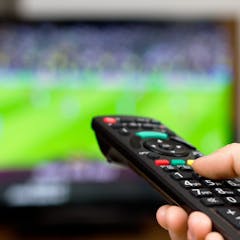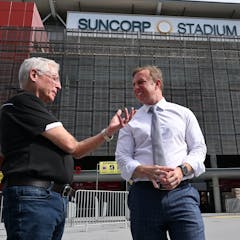
Articles on Paralympics
Displaying 1 - 20 of 53 articles

Running is empowering for many blind and partially sighted people, but they can face a range of societal barriers to get involved.

A new Olympic funding strategy aims to boost the finances of smaller Australian sports like table tennis – but will it actually work?

From what sports you can watch with an old aerial, to what apps you’ll see when you switch on a new smart TV – sports lovers can expect big changes ahead.

Queensland premier Steven Miles is walking a tightrope in trying to deliver a spectacular yet sustainable, legacy-driven 2032 Brisbane Olympics.

In the UK, many disabled people continue to feel excluded from participating in sports.

Mega-events like the Olympics have the potential to start important conversations around societal change. But improving the lives of disabled people takes much more than that.

Sport policy and practices to support pregnant athletes impacts athletes across all levels of sport. We have an opportunity to change the future for athletes.

It’s time for organizations like the IPC to stop lamenting the intersection of sport and politics, and instead accept this well-established reality going forward.

What FIFA’s leadership still fails to realise is banning Russia does not introduce politics into sports – it removes the stench of it.

Some reports suggest around 24% of Olympians and Paralympians suffer with poor mental health after the Games.

Within the parasport community itself, inclusivity and access is a real issue, especially for those who do not fit the mold of how we think an athlete “should” look or move.

Most sporting equipment is designed with typical able-bodied athletes in mind, whereas custom equipment to meet a particular Paralympian’s needs can be expensive. 3D printing offers a third way.

Some Paralympic powerlifters lift heavier weights than athletes without disabilities. Here’s what we know about why this might be.

The #WeThe15 movement is rooted in good intention and falls short in a big way by using the Paralympic Games as a backdrop to its launch.

The media determines how Paralympians are depicted to viewers. What it chooses to focus on can help change attitudes about disability.

The Paralympics are the stage for a battle between the exclusivity of elite sport and the inclusivity the movement aims to nurture. Can the event effect true social change?

As the Summer Games warm up, more research is needed on how heat acclimation can help Paralympians in particular prepare for extreme conditions

The 2024 Paris Paralympics are cutting four swimming events. Those who will be affected are athletes with the most severe impairments.

Since the Games’ post-war beginnings, the Paralympics have become the second-largest mega-event in the international sporting calendar. Is the core purpose being lost?

Physical activity barriers are still prevalent for people with disabilities, despite the increase in participation in the Paralympic Games.
